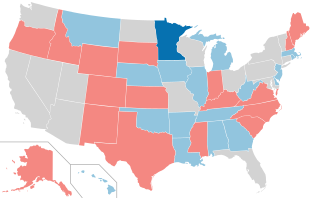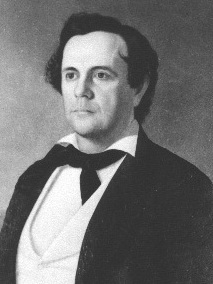
Thomas Miller McClintock II is an American politician serving as the U.S. representative for California's 5th congressional district since 2009. His district stretches from the Sacramento suburbs to the outer suburbs of Fresno;it includes Yosemite National Park. A member of the Republican Party,McClintock served as a California state assemblyman from 1982 to 1992 and from 1996 to 2000,when he became a California state senator,a position he held until 2008. He unsuccessfully ran for governor of California in the 2003 recall election and for lieutenant governor of California in the 2006 election.

Alfred Alexander Taylor was an American politician and lecturer from eastern Tennessee. He served as the 34th governor of Tennessee from 1921 to 1923,one of three Republicans to hold the position from the end of Reconstruction to the latter half of the 20th century. He also served three terms in the U.S. House of Representatives,from 1889 to 1895.

James O. Naifeh is an American politician and member of the Democratic Party from the State of Tennessee. He served as the Speaker of the Tennessee House of Representatives from 1991 to 2009,serving longer in that position than anyone else in Tennessee history.

The 1990 United States Senate elections were held on Tuesday,November 6,1990,with the 33 seats of Class 2 contested in regular elections. Special elections were also held to fill vacancies. The Democratic Party increased its majority with a net gain of one seat from the Republican Party. The election cycle took place in the middle of President George H. W. Bush's term,and as with most other midterm elections,the party not holding the presidency gained seats in Congress. This was the first time since 1980 that any party successfully defended all their own seats,and the first time Democrats did so since 1958.

The 1984 United States Senate elections were held on November 6,with the 33 seats of Class 2 contested in regular elections. They coincided with the landslide re-election of President Ronald Reagan in the presidential election. In spite of the lopsided presidential race,Reagan's Republican Party suffered a net loss of two Senate seats to the Democrats,although it retained control of the Senate with a reduced 53–47 majority.

The 1978 United States Senate elections were held on November 7,in the middle of Democratic President Jimmy Carter's term. The 33 seats of Class 2 were contested in regular elections. Special elections were also held to fill vacancies.

The 1970 United States Senate elections was an election for the United States Senate. It took place on November 3,with the 33 seats of Class 1 contested in regular elections. Special elections were also held to fill vacancies. These races occurred in the middle of Richard Nixon's first term as president. The Democrats lost a net of three seats,while the Republicans and the Conservative Party of New York picked up one net seat each,and former Democrat Harry F. Byrd Jr. was re-elected as an independent.

The 1930 United States Senate elections occurred in the middle of Republican President Herbert Hoover's term. The 32 seats of Class 2 were contested in regular elections,and special elections were held to fill vacancies. With the Great Depression beginning to take hold,Republican incumbents became unpopular,and Democrats picked up a net of eight seats,erasing the Republican gains from the previous election cycle,however,Republicans retained control of the chamber. This was the first of four consecutive Senate elections during the Depression in which Democrats made enormous gains,achieving a cumulative pick-up of 34 seats.

The 1864–65 United States House of Representatives elections were held on various dates in various states between June 5,1864,and November 7,1865,in the midst of the American Civil War and President Abraham Lincoln's reelection. Each state set its own date for its elections to the House of Representatives. Members were elected before the first session of the 39th United States Congress convened on December 4,1865,including the at-large seat from the new state of Nevada,and the 8 from Tennessee,the first secessionist state to be readmitted. The other 10 secessionist states had not yet been readmitted,and therefore were not seated.

The 1834–35 United States House of Representatives elections were held on various dates in various states between July 7,1834,and November 5,1835. Each state set its own date for its elections to the House of Representatives before the first session of the 24th United States Congress convened on December 7,1835. They were held during President Andrew Jackson's second term. Elections were held for 240 seats that represented 24 states,as well as the at-large-district seat for the pending new state of Michigan.
Jason Everett Mumpower currently serves as Tennessee's 35th Comptroller of the Treasury. He was first elected to the position by the Tennessee General Assembly on January 13,2021. He is responsible for leading the Office of the Comptroller of the Treasury,which comprises 12 divisions and more than 560 employees,and ensuring the Office fulfills its mission to make government work better.
Jerome Cochran is a Tennessee lawyer and Republican politician who served for two terms in the Tennessee House of Representatives. He was elected as a member of the Tennessee House of Representatives to the 103rd and 104th General Assembly for the 4th District,which at the time encompassed the entirety of Carter County.

Nathaniel Green Taylor was an American lawyer,farmer,and politician from Tennessee. He was U.S. Representative from Tennessee from 1854 to 1855,and again from 1866 to 1867,and Commissioner of Indian Affairs from 1867 to 1869.

The Tennessee Democratic Party (TNDP) is the affiliate of the Democratic Party in Tennessee. The party was founded in 1826 initially as the Jacksonian Party. The Tennessee Democratic Party was born out of President Andrew Jackson's populist philosophy of Jacksonian democracy in the mid to late-1820s. After Jackson left office,the Democratic Party struggled in the state as the Whig Party would go on to be the dominant party in Tennessee until its collapse after the 1852 Election. Prior to the Civil War,as a result of the collapse of the former Whig Party,the Democratic Party became the dominant party in the state. After the war ended,the Republican Party would be the dominant political party during Reconstruction,but once Reconstruction ended,the Democratic Party would dominate Tennessee Politics up until 2011 when the Republican Party would gain firm control of Tennessee State Government.

Terri Lynn Weaver is an American politician who was a member of the Tennessee House of Representatives from 2009 to 2023. She represented the 40th district,which is composed of Smith,Trousdale,most of DeKalb,and part of Sumner counties.
Scotty Campbell is an American politician and professional wrestling promoter. He was a Republican member of the Tennessee House of Representatives for the 3rd district,encompassing Mountain City,Johnson County,and parts of Sullivan County.
John B. Holsclaw Jr. is an American politician. A Republican,he represents District 4,which includes Unicoi County and parts of Carter County,in the Tennessee House of Representatives.

Mark Cochran is an American politician. A member of the Republican Party,he represents District 23 in the Tennessee House of Representatives. He was elected as part of the 111th general assembly in November 2018. He was preceded by Republican representative John W. Forgety. District 23 encompasses McMinn County and parts of Monroe County. Cochran began serving as the treasurer for the Tennessee State House of Representatives in 2019.

Tom Leatherwood is an American politician serving in the Tennessee House of Representatives from Tennessee's 99th house district,since 2019. He is a member of the Republican Party. The 99th district includes the Northeast part of Shelby County,Tennessee,including the Town of Arlington,City of Lakeland,City of Millington,parts of North and East Bartlett,and unincorporated Northeast Shelby County.

Tennessee state elections in 2022 were held on Tuesday,November 8,2022. Primary elections for the United States House of Representatives,governorship,Tennessee Senate,and Tennessee House of Representatives,as well as various judicial retention elections,including elections for all five Tennessee Supreme Court justices as well as general local elections,were held on August 4,2022. There were also four constitutional amendments to the Constitution of Tennessee on the November 8 ballot.
















